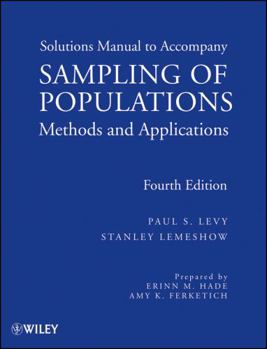Sampling of Populations: Methods and Applications, Solutions Manual
Sampling of Populations, Fourth Edition continues to serve as an all-inclusive resource on the basic and most current practices in population sampling. Maintaining the clear and accessible style of the previous edition, this book outlines the essential statistical methodsfor survey design and analysis, while also exploring techniques that have developed over the past decade.
The Fourth Edition successfully guides the reader through the basic concepts and procedures that accompany real-world sample surveys, such as sampling designs, problems of missing data, statistical analysis of multistage sampling data, and nonresponse and poststratification adjustment procedures. Rather than employ a heavily mathematical approach, the authors present illustrative examples that demonstrate the rationale behind common steps in the sampling process, from creating effective surveys to analyzing collected data. Along with established methods, modern topics are treated through the book's new features, which include:
A new chapter on telephone sampling, with coverage of declining response rates, the creation of "do not call" lists, and the growing use of cellular phones A new chapter on sample weighting that focuses on adjustments to weight for nonresponse, frame deficiencies, and the effects of estimator instability An updated discussion of sample survey data analysis that includes analytic procedures for estimation and hypothesis testing A new section on Chromy's widely used method of taking probability proportional to size samples with minimum replacement of primary sampling units An expanded index with references on the latest research in the fieldAll of the book's examples and exercises can be easily worked out using various software packages including SAS, STATA, and SUDAAN, and an extensive FTP site contains additional data sets. With its comprehensive presentation and wealth of relevant examples, Sampling of Populations, Fourth Edition is an ideal book for courses on survey sampling at the upper-undergraduate and graduate levels. It is also a valuable reference for practicing statisticians who would like to refresh their knowledge of sampling techniques.





